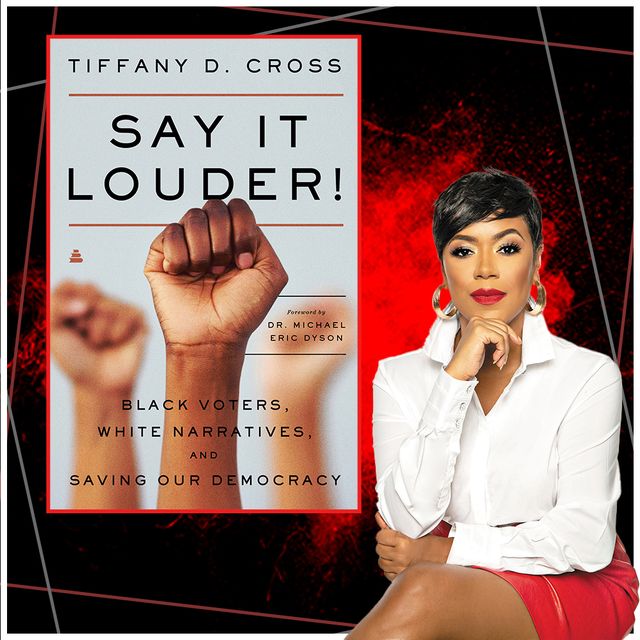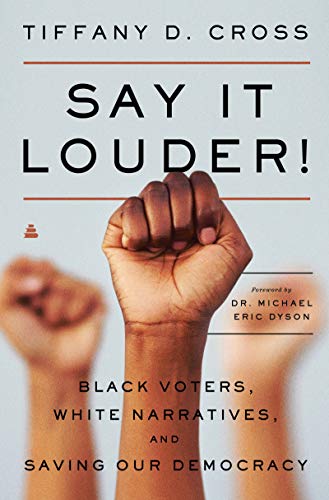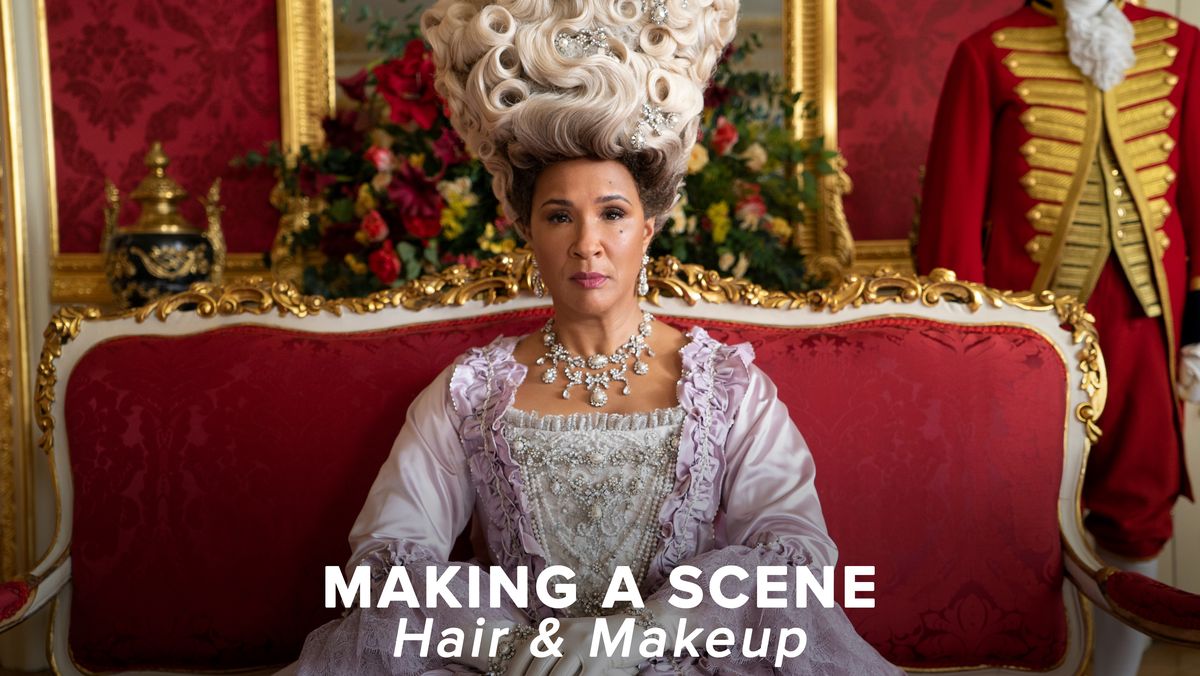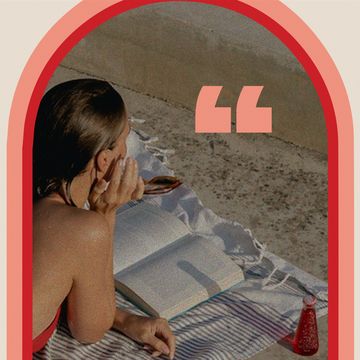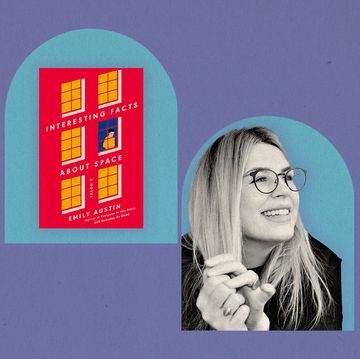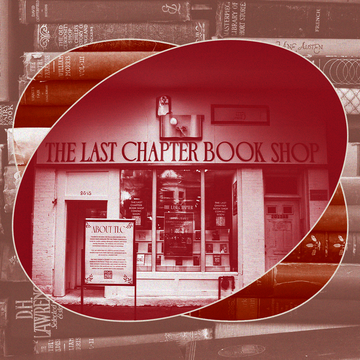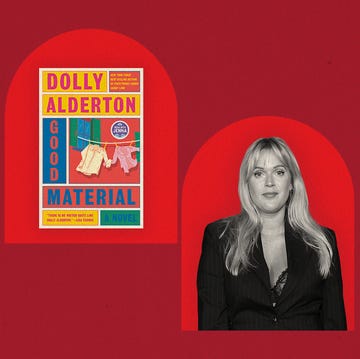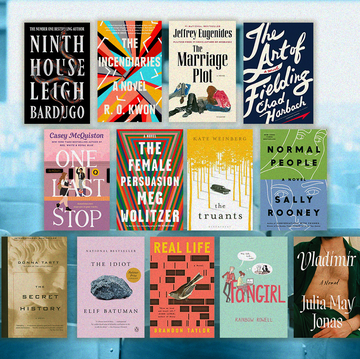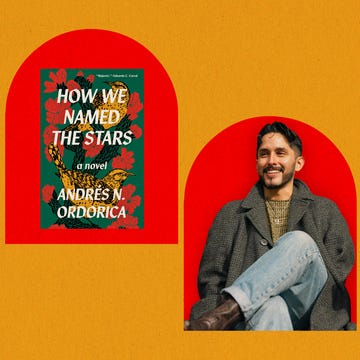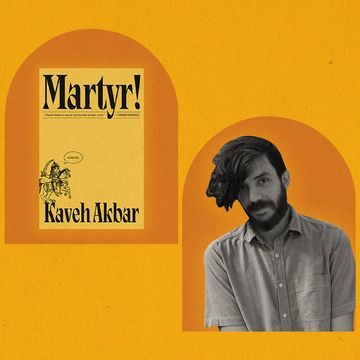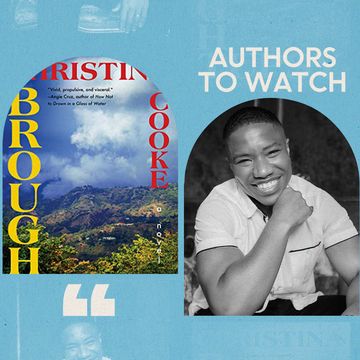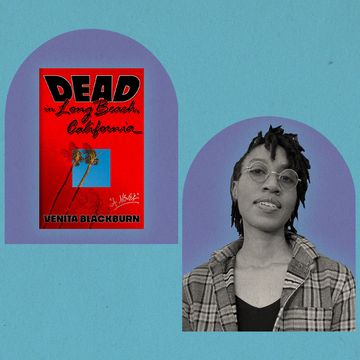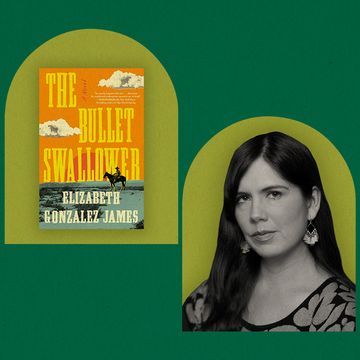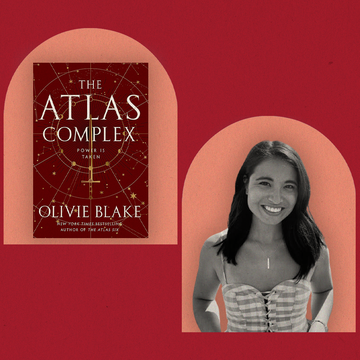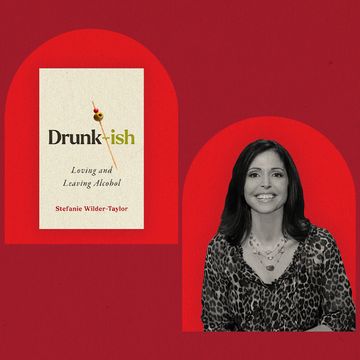When asked what she wants readers to take away from her new book, Say It Louder!: Black Voters, White Narratives, and Saving Our Democracy, Tiffany D. Cross says she hopes Black people take their power back.
“Black people have a unique patriotism and role in the American body politics that is unlike no other community in this country,” Cross says. “We have shaped and swayed this democracy, and have never been thanked, properly. And it's okay, right now in this moment, for us to bypass the desire to be thanked, and grab the power that we are owed and that we have earned.” As a resident fellow at the Institute of Politics at the Harvard Kennedy School, an on-air political analyst, and now author, Cross is also beloved by many viewers of MSNBC's AM Joy (where she frequently appears) who are passionately rooting for her to assume the role as host. Her debut book has been described by journalist and MSNBC anchor Joy-Ann Reid as a call to action, and Cross agrees.
“It's a call to action, not just for Black people, but to white power brokers and the media landscape,” she says. “It's a call to action to gatekeepers in the political landscape. It's a call to action to people who have feigned ignorance to our centuries of brutality in this country. And certainly it's a call to my people to first say, thank you, for shaping and saving this democracy throughout time. And second, to say, let’s reimagine America together.”
Shondaland spoke with Cross about the timeliness of her new book, why self-care is a necessity for Black women, and what this current moment in history means to her.
JULIANA UKIOMOGBE: To start, what was the inspiration for the book cover?
TIFFANY D. CROSS: I had a completely different vision and I was going back and forth with the publisher about it. I wanted a Black woman’s fist punching through an American flag. I wanted that fist to be bruised and bloody, just to show what we as Black women have gone through in this country. My publisher was not into it, at all. And these are Black people, they understand what I was trying to say, but they thought the imagery would not be consistent with the content. They didn't think it would mesh well with people looking at the cover. So, we landed in the middle.
JU: Michael Eric Dyson wrote a really brilliant foreword for your book. Did you always have him in mind to write something?
TDC: I didn't actually. I didn't know that I would have a foreword at all. The publisher really wanted me to have one. When I was thinking about who that might be, I wanted something that was a compliment to my voice, but also countered my voice.
Michael Eric Dyson and I did a Black History Month event with ABC News, and we were on the panel together and we've known each other for 10 years. But on the panel, we were both just finishing each other's sentences and both very passionate about the topic of Blackness in America, specifically as it related to media and voting. After the panel, he actually asked, “Hey, when is your book out? Send me some stuff about it, let me write your foreword.” It was very casual. I was very honored to have him pen the foreword, and I'm so grateful to him.
JU: My favorite chapters are the ones titled, “Silencing Black Women” and “Kamala’s Campaign.” How important was it for you to dedicate whole sections to Black women?
TDC: I enjoyed writing those chapters. To begin with the chapter, “Silencing Black Women,” as a Black woman, I have felt silenced throughout my career at different points. When I watched some things on television, like the effort to reinvent Melania Trump, it's insulting and infuriating, especially when we saw what Michelle Obama went through as one of the most elegant, educated, and graceful first ladies the country had ever seen. It was outrageous that we would land here again, after we thought we had overcome at least some of these things. So I wanted to reckon with the feminist movement, from “Me Too” to “Believe All Women,” and point out to white women how they are problematic, and if they are interested in changing the landscape, here are some examples of where you have fallen short, and here is a roadmap to how you can ally, if that is your true interest. While I wrote this book to Black people, I did not write it exclusively for Black people. Because of the unique role that we play in society, I would hope that everyone would want to consume information about their fellow countrymen, and what our unique role has been in shaping this democracy. I wanted it to be something that everyone could learn from.
For the Kamala Harris chapter, I covered her campaign and then spoke a lot about her campaign, and I thought I was treating her fairly — I treated her like everybody else. But once she exited the campaign and we were left with this trio of white men, I thought about what she had to go through to achieve this space, and it was not the same as what those white men had to go through. So in writing this chapter, I wanted to be very fair to her story. Her campaign highlighted a chasm between Black men and Black women, and then Black people and everybody else. So in this weird way, Kamala Harris' campaign unearthed some conversations that need to be had amongst us as Black people, particularly as we relate to each other as Black men and women. It also highlighted something about how the political and media landscape covered us as voters, but also as candidates, and the lack of understanding that newsrooms have around the Black experience.
I think it could have been the whole book, but I wanted to at least dedicate a chapter to that. And I just find her to be a lovely human being who ran a flawed campaign, but who also achieved history. I want to acknowledge that, and I'm so incredibly proud of her for the work that she did. She did it with dignity and grace in the face of a lot of disrespect. I just wanted to honor her role in that.
JU: In the book, you do a great job of detailing “how we got here,” from the Red Summer of 1919 to Russia's interference. Is there any one moment that you deem most pivotal for how we arrived at this point, or is it rather a combination of things?
TDC: I don't think I could pinpoint a single moment. Just like we can't say that George Floyd is how we got here, you know? It was a build-up. I think going back to 1619, and pointing out the ways that Black people have been brutalized, how we've had the humanity beaten out of us, how we were turned into beasts of burden, how we were killed, lynched, murdered, burned, and endured unimaginable cruelty. It has brought us to this moment of racial reckoning, centuries in the making. And we don't know what comes next, but we know that things are going to change forever. We aren't going back and we will be the architects of what comes next.
For me personally, I know there are a lot of voices of opposition. I know there are people who will never celebrate or elevate equality, but my personal mantra, and just the calling on the ancestors that I feel in my spirit, is I will fight to the death before I lay down and die. And I hope that a lot of other people feel that way too.
JU: Your book is being published at the intersection of Black Lives Matter protests, countless media companies finally acknowledging their racism, and the upcoming election cycle. What does this moment mean to you?
TDC: This is a cultural shift in America. Right now you have people at home and they're frustrated because the economy is shut down, and they have a unique moment to pay attention to some of the social injustice that we have long gone on about. I wonder what happens when this moment is not cool anymore and when Black Lives Matter t-shirts are not as fashionable anymore. So, I want to cement our battle cry that we are here. We are not going anywhere. We are not asking. We are demanding our humanity. We've said it before multiple times, and the needle moved a little bit. This time, we're saying it louder.
JU: Do you think prioritizing self-care should be a necessity for all people?
TDC: We have to. I had a very challenging time when I saw the video of Rashard Brooks being murdered. I still tear up when I talk about it, because I know that person; there are so many people in my family who are that person, and it just breaks my heart to think about it. We're seeing Black bodies fall and we take all that in. Every day there are more videos of people being harassed. So, I either have an endless stream of tears or those tears turn to ice and I'm ready to fight. I bounce between those two states. I imagine that we all do. It's a hard space to occupy for years at a time.
As Black women, we're so used to caring so much, and sometimes we crumble because there's just only so much as human beings that we can take. We have to figure out a way to keep the fight, but also to keep ourselves sane. I haven't really figured that out yet. I think everybody has to figure it out for themselves. I wish I had some advice that I could give to people for escapism, but I haven't quite figured out how to mend my broken heart yet.
JU: Many young Black people will be voting for the first time in November, and may feel discouraged that their voice won’t matter to a system that doesn't value their lives. What would you say to those people?
TDC: There's a woman by the name of LaTosha Brown, and she runs an organization called Black Voters Matter. I write about her in the book. She gave the best argument for this feeling of apathy. She acknowledged that systems of white supremacy have always imprisoned us in some form or another. They've always poisoned us in some form or another. They've always oppressed us in some form or another. So she said, “I'm not asking you to believe in this system, I'm asking you to believe in you.”
So I would echo that to young people, that if you don't like what you see at this moment, we can burn the system down and create anew. I don't mean literally, not fire or anything, but I mean, a lot of us became a part of this system to disrupt it. So I stand with them and encourage them to keep disrupting the system from the outside and to participate in civic engagement, because that is a way to disrupt as well.
This interview has been edited and condensed for clarity.
Juliana Ukiomogbe is a freelance writer who covers books, film, and wellness. You can follow her on on Twitter: @juliana_uki
Get Shondaland directly in your inbox: SUBSCRIBE TODAY
